Pakistan’s young people are seeing big changes in their religious views and practices. This shift shows how youth are diving into faith, trying to mix old traditions with new ideas. It’s a complex mix, full of chances for spiritual growth but also challenges in sticking to old ways.
Key Takeaways
- The rising youth engagement in faith exploration in Pakistan
- Opportunities for spiritual development among the younger generation
- Challenges in balancing cultural traditions and modern influences
- The role of religious institutions in shaping youth beliefs
- The impact of social media on youth religious expression
The Rise of Youth Engagement in Faith Exploration
In Pakistan, a big change is happening. The country’s youth are diving into their religious beliefs more than ever. This change brings both chances and hurdles for the next generation.
Opportunities for Spiritual Development
More young people are exploring their faith, thanks to new resources and platforms. They can join interactive youth ministry programs and lively religious groups. These options help them grow closer to their faith.
Challenges in Embracing Traditional Practices
While exploring faith is a good thing, it also brings challenges. Young Pakistanis face the hard task of balancing modern life with traditional values. They need a way to mix the old with the new in their faith journey.
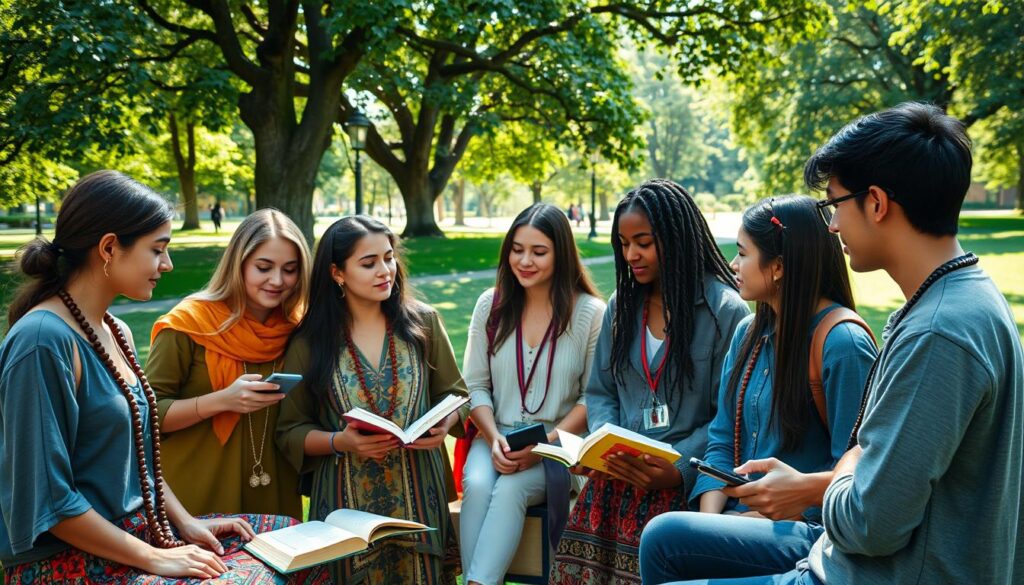
“The journey of faith exploration is not without its obstacles, but it is a testament to the resilience and adaptability of Pakistan’s youth.”
As Pakistan’s youth keep searching for spiritual growth, it’s key to support them. We should celebrate their unique faith journeys while respecting the country’s rich traditions.
The Role of Religious Institutions in Shaping Youth Beliefs
Religious institutions are key in shaping Pakistan’s youth. They teach, offer programs, and reach out to young people. This helps shape their beliefs and practices.
These places provide a space for spiritual growth. They help young people develop their perspectives and worldviews. This is crucial for the country’s future leaders.
Religious institutions impact youth beliefs through education. They offer Sunday schools, youth groups, seminars, and retreats. These opportunities teach young people about their faith.
This education helps them understand and appreciate their traditions and values. It connects them to their heritage.
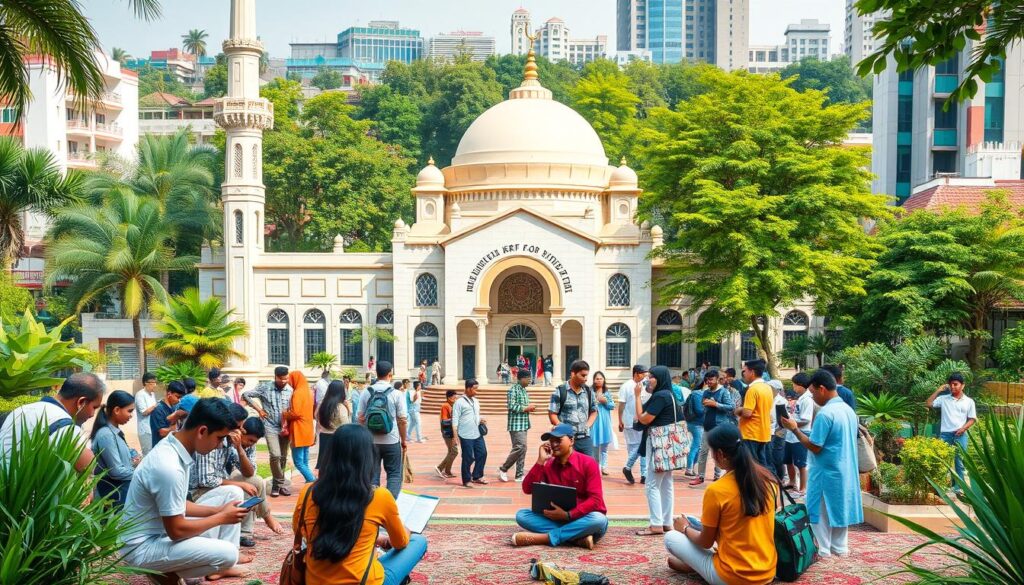
These institutions also organize community events and service projects. Young people get involved in these activities. It strengthens their faith and teaches them about social responsibility.
This approach helps shape the next generation of leaders. It prepares them for religious and community roles.
However, there are challenges. The world is changing fast, and young Pakistanis see different views. Religious institutions must adapt to meet these new needs.
They need to keep faith formation relevant and meaningful. This ensures that young people stay connected to their faith.
“Religious institutions play a crucial role in guiding the spiritual development of youth, but they must also be responsive to the unique needs and experiences of this generation.”
By understanding the changing needs of youth beliefs and religious education, institutions can continue to guide the next generation. They can help shape their faith and values.
Youth and Faith: Navigating the Generational Divide
In Pakistan, youth and faith meet in a complex way. Young people try to mix old traditions with new ideas. They aim to respect their elders while following their own dreams.
Balancing Cultural Traditions and Modern Influences
It’s tough for youth to find a balance. They want to keep their faith’s values but also enjoy modern trends. This balance is hard to achieve.
Some young Pakistanis mix old faith with new views. Others face hard choices between their beliefs and family expectations. This can cause tension between young and old.
“The generational divide is not just about age, but about the fundamental differences in how we understand and practice our faith. Finding a way to bridge that gap is crucial for the future of Pakistani youth.”
Yet, there’s a chance for both sides to talk and work together. Open talks can help everyone understand each other better. This strengthens faith and community ties.
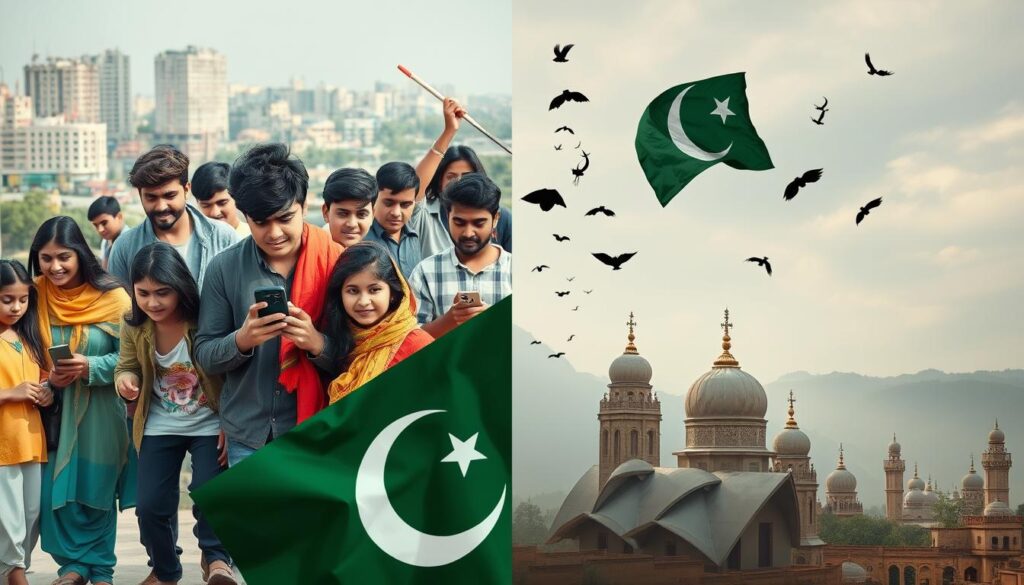
- The youth of Pakistan are navigating the balance between upholding cultural traditions and embracing modern influences.
- This generational divide can lead to tensions as the elders strive to preserve the cultural and religious heritage while the youth seek autonomy in their spiritual journeys.
- However, there are also opportunities for meaningful dialogue and collaboration between the youth and the elder generation.
Fostering Inclusive and Diverse Religious Spaces
In Pakistan, the views of youth on religion are changing. It’s key to create spaces where everyone can come together. These places help young people from different backgrounds to explore their faith and understand each other better.
Programs based on faith are very important in this effort. They offer youth ministry and faith-based programs. This helps create spaces where everyone feels welcome, regardless of their beliefs.
These programs help young people talk openly and learn from each other. They do things like workshops and community service. This way, they get to see the variety of religious practices and beliefs in their society.
“Inclusive religious spaces are essential for the personal and spiritual growth of our youth. They foster a sense of belonging and empower young people to embrace their faith while respecting the beliefs of others.”
By creating these inclusive religious spaces and diverse religious spaces, religious groups can shape the future of youth in Pakistan. This approach helps young people grow in their faith and learn important values like tolerance and respect. These values are crucial for a peaceful and lively society.
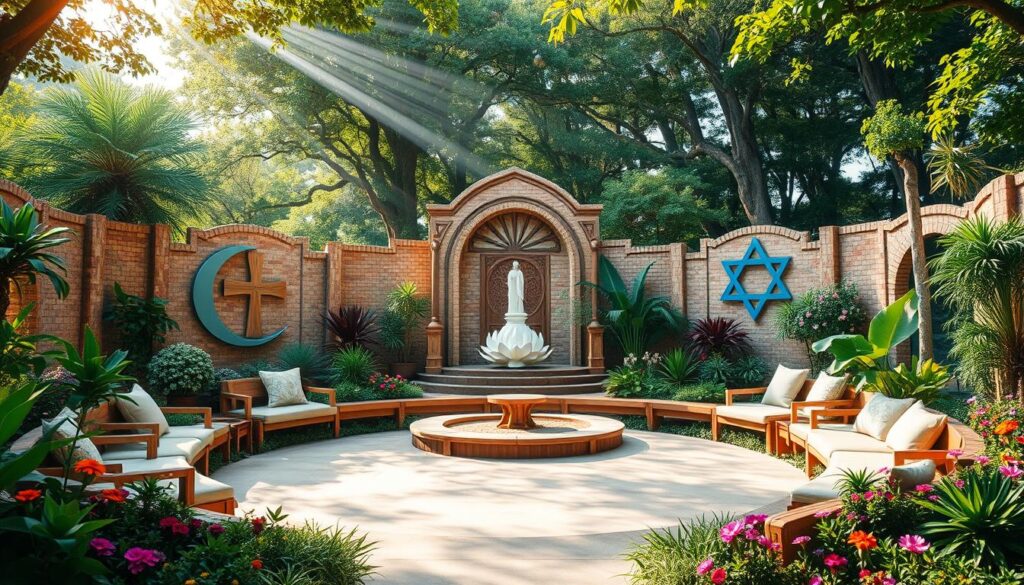
The Impact of Social Media on Youth Religious Expression
In today’s world, social media is a big deal for young Pakistanis. It lets them share and learn about their faith. Online faith groups and digital outreach are changing how youth connect with their spirituality.
Online Faith Communities and Digital Outreach
Social media has made it easy for young people to find others who believe the same. They can talk, share, and learn together online. Instagram, Facebook, and YouTube are where they share their stories and faith.
Young Pakistanis are really into religious content online. Almost 60% of them say it makes them feel closer to their faith. This has made old ways of teaching faith more important, too.
“Social media has become a powerful tool for youth to explore and express their religious beliefs in ways that resonate with their digital-native lifestyles. It has opened up new avenues for engaging with faith in a more personalized and interactive manner.”
But, social media isn’t perfect for youth faith. It’s hard to balance online and real-life faith. Also, making sure online faith content is true is a big challenge.

As social media’s role grows, it’s key for faith leaders and youth groups to work together. They need to create safe, welcoming online spaces for Pakistan’s youth to grow spiritually.
Faith-Based Youth Initiatives and Programs in Pakistan
In Pakistan, faith-based groups and religious places are leading many youth programs. They aim to help young people grow spiritually, learn about their faith, and get involved in their communities.
The Roshni Youth Program is a great example. It offers religious classes and workshops for teens. Kids learn about their faith, religious practices, and their spiritual identity through fun activities.
The Al-Huda International School network is another example. It has schools that teach both faith and a full curriculum. These schools help students from all backgrounds learn Islamic values and grow academically and personally.
Groups like the Pakistan Youth Ministry also play a big role. They organize youth camps, retreats, and community service projects. These activities help young people feel connected and inspire them to become future religious leaders.
“These faith-based initiatives are vital in shaping the spiritual and moral development of Pakistan’s youth. They provide a platform for young people to explore their faith, connect with their communities, and become active stewards of their religious heritage.”
As faith beliefs change, these programs are key. They help Pakistan’s young people understand and value their faith more deeply.
Exploring Interfaith Dialogue Among Youth
In Pakistan, the religious scene is changing, and youth dialogue is key. This exchange helps build understanding, respect, and appreciation for the country’s diverse cultures and faiths.
Building Bridges of Understanding and Respect
Young Pakistanis are working to bridge faith gaps. They see the value in open talks. Through interfaith dialogues, they challenge stereotypes and find common values.
These talks let youth share their stories and learn about others’ beliefs. They create a space of respect and understanding. This helps break down walls and promotes religious diversity and cultural exchange.
“Interfaith dialogue is not just about tolerance, but about actively seeking to understand and appreciate the richness of our diverse religious heritage.”
– Fatima, a passionate youth advocate for interfaith understanding
Young Pakistanis are changing how we see religious identity. They’re moving towards a more inclusive society. Their efforts promise a brighter future for interfaith dialogue in Pakistan.
Youth and Faith: Redefining Religious Identity
In Pakistan, the young are changing how they see their faith. They mix their beliefs with culture and modern life in new ways. This mix is changing how they show their spirituality.
Young people want to keep old traditions but also see things in new ways. They pick what fits their life and views. This lets them stay connected to their roots while facing today’s world.
The internet has also changed things for them. It lets them find many different teachings and stories. This has made them think more about faith and challenge old ideas. They are making their own unique spiritual paths.
This change isn’t just about personal beliefs. It’s also about how they see religious groups and places. They want places that are open and growing with them. They’re pushing against old ways of doing things.
The young are making a big impact on Pakistan’s faith scene. Their search for meaning and spiritual growth will change how faith is practiced. They’re bringing in a fresh era of faith and community.
The Future of Religious Education and Youth Engagement
In Pakistan, the youth face a changing world of faith and spirituality. They need solid religious education and active youth engagement more than ever. Religious groups, government officials, and youth leaders must join forces. They aim to prepare the next generation for their spiritual journey.
Creating faith formation programs that meet young Pakistanis’ needs is key. These programs should be open and engaging. They help bridge the gap between generations and let youth discover their spiritual sides. Using technology can also make these programs more accessible, reaching more young people.
Don’t forget the importance of youth ministry and campus religious groups. They are essential for spiritual growth. They offer chances for deep conversations, community service, and building friendships. Supporting these programs ensures a strong future for faith in Pakistan.
- The Rise of Youth Engagement in Faith Exploration
- The Role of Religious Institutions in Shaping Youth Beliefs
- Youth and Faith: Navigating the Generational Divide
- Fostering Inclusive and Diverse Religious Spaces
- The Impact of Social Media on Youth Religious Expression
- Faith-Based Youth Initiatives and Programs in Pakistan
- Exploring Interfaith Dialogue Among Youth
- Youth and Faith: Redefining Religious Identity
- The Future of Religious Education and Youth Engagement
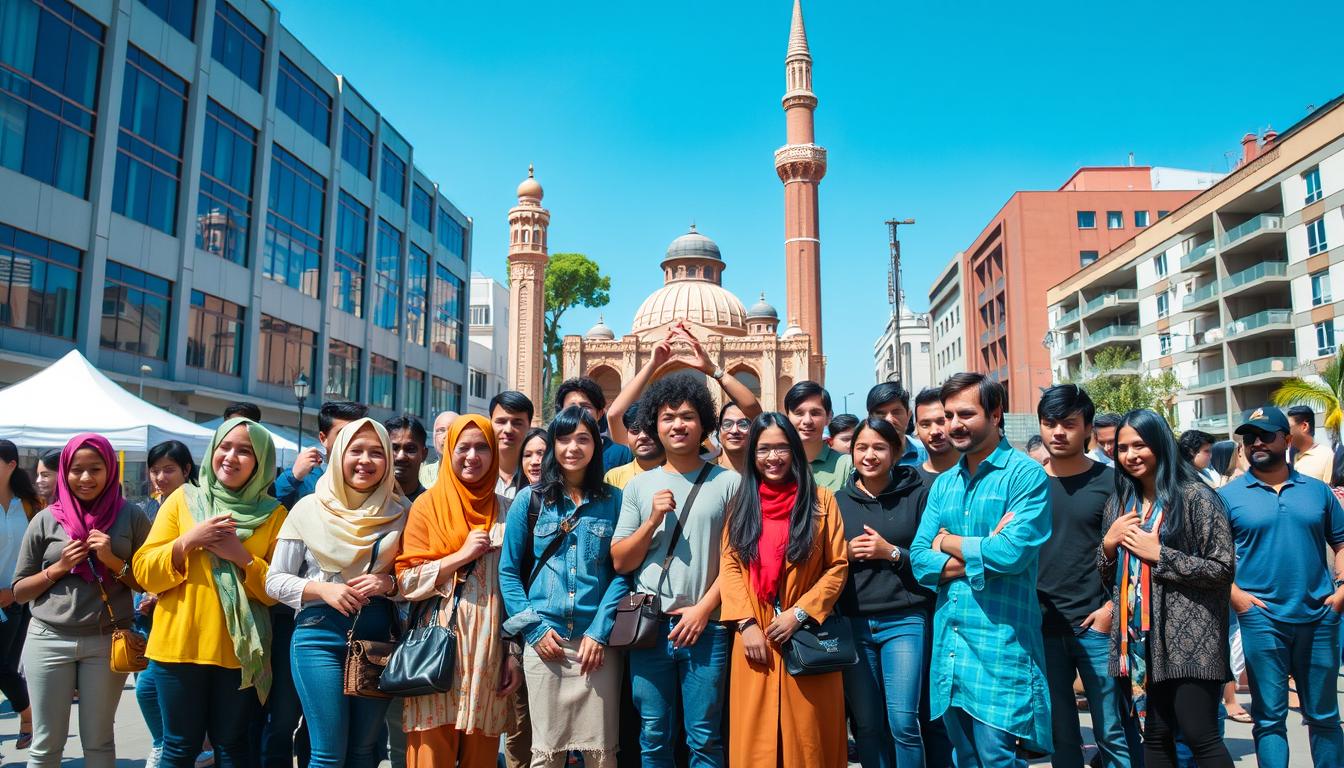
Thanks for sharing your thoughts. I really appreciate your efforts and I will be waiting for
your further write ups thanks once again.
Heya i’m for the first time here. I found this board and I to find It really helpful
& it helped me out much. I hope to provide something back and aid others such as you
aided me.
You are so cool! I don’t believe I’ve read anything like this before.
So great to find someone with genuine thoughts on this issue.
Really.. thanks for starting this up. This website
is one thing that is needed on the internet, someone with some originality!
I appreciate the message.I am really anticipating
reading more. Very cool. https://educationlibya.org/